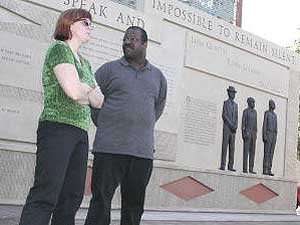|
Audio
Photos
More from MPR
Resources
Your Voice
|
Dedicating a memorial
October 10, 2003
 |
| Heidi Bakk-Hansen and Henry Banks stand by the memorial in downtown Duluth. (MPR photo/Chris Julin) |
 | |||
Duluth, Minn. — Eighty years ago, mobs of white people lynched black people. It was fairly common in the United States -- especially in the Deep South. Thousands of black men were murdered. They aren't remembered on many public monuments. There are markers in cemeteries, and a few roadside historical plaques.
But now there's a monument in the middle of a city. It's here in downtown Duluth. You can't miss it. A 10 foot-high wall wraps around the park. It's covered in quotations, and three life-size, bronze statues project from the wall.
The statues memorialize Elmer Jackson, Elias Clayton and Isaac McGhie. They died on this corner.
It was a June night, back in 1920. There might have been 10,000 white people in the streets.
The people in the mob believed some black men had raped a white woman at a traveling circus. The charges were improbable, but the mob broke into the jail and dragged the three men outside.
|
Yes, it happened in Duluth. No, we're not proud of it. But we're going to learn from it.
- Duluth Mayor Gary Doty |
They hanged the men from a street light, and they took a photograph. Dozens of smiling white men crowded around the battered corpses of three black men.
The lynching was big news. It even made the front page of the New York Times.
But the news got stale, and white people in Duluth quit talking about it. People grew up in Duluth not knowing anything about the lynching. But in recent years, people in Duluth have been talking about the lynching again.
"This is a celebration of the lives of three young men," Mayor Gary Doty said as he stood at the monument during a news conference last week.
When the idea for the monument first came up, Doty said he didn't like it. He didn't want a downtown monument to something so negative. But he changed his mind. He helped get city money for the project, and he helped raise private donations. Doty says the city is "taking ownership" of the lynching.
"Yes, it happened in Duluth," Doty said. "No, we're not proud of it. But we're going to learn from it."
The idea for the monument started with Henry Banks. About three years ago, a reporter with a local weekly called the Ripsaw, interviewed Banks. The reporter was writing a story about the lynching. The reporter's name is Heidi Bakk-Hansen.
 | |||
"One of the most important things that came out of it was Henry insisting that we had to do something more than just write an article," Bakk-Hansen says.
"We did it," Henry Banks says with a smile.
At first, Banks was thinking of a plaque -- a historical marker somewhere on the corner where the lynching happened. Banks and Bakk-Hansen, and about a dozen other people, volunteered to help raise money and to make plans.
But the group kept growing, and so did the plans.
Eventually, hundreds of people lent a hand. They were black, white -- of every race. From high school kids, to retired folks, to the mayor. For the past two years, they've put on concerts and art exhibits. They've held marches, lectures and dances. And now, they've built the memorial park in downtown Duluth.
"We have actually taken a grassroots group of people who had a vision, and made that vision happen," Henry Banks says. "I'm just overwhelmed by that."
While Banks is talking, a woman stops on the sidewalk next to the monument. She's wearing a dirty winter jacket, and she's carrying a plastic grocery bag with a hole in it. She stands looking at the monument for a minute, and then walks on.
Heidi Bakk-Hansen works downtown, and she passes the monument every day.
"And every time I come by I've watched people walk by, stop, and they look for a good long time," Bakk-Hansen says. "When I'm on the bus, everybody turns, and they look. And they look. And sometimes they'll talk a little to the person sitting next to them. And I think that is the most gratifying to me."
The Clayton-Jackson-McGhie Memorial will be officially unveiled at noon on Friday.
|
News Headlines
|
Related Subjects
|
